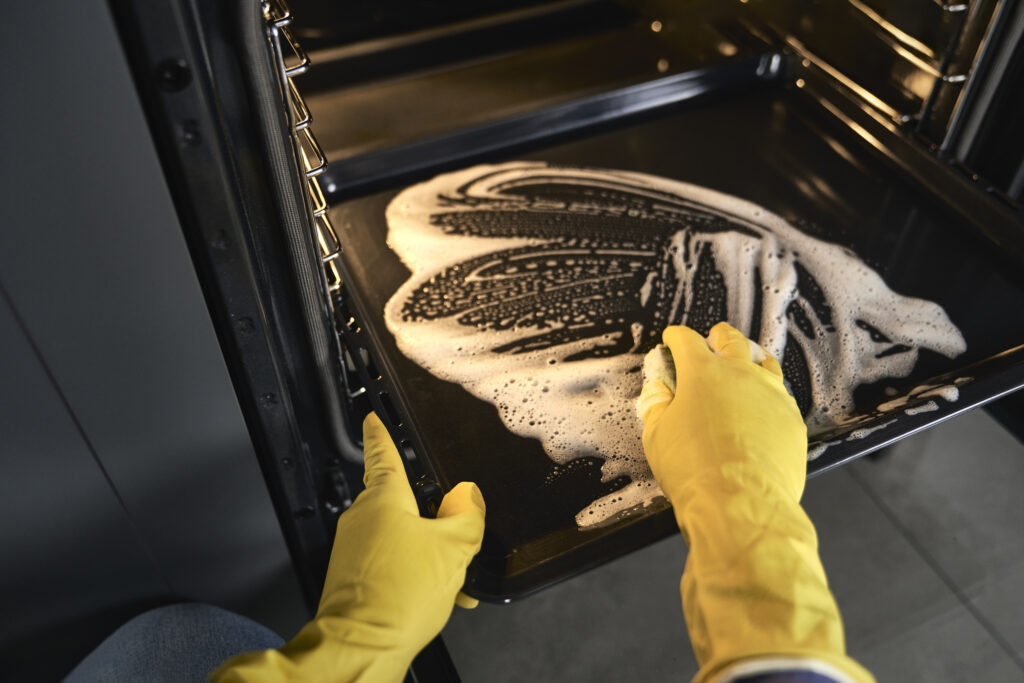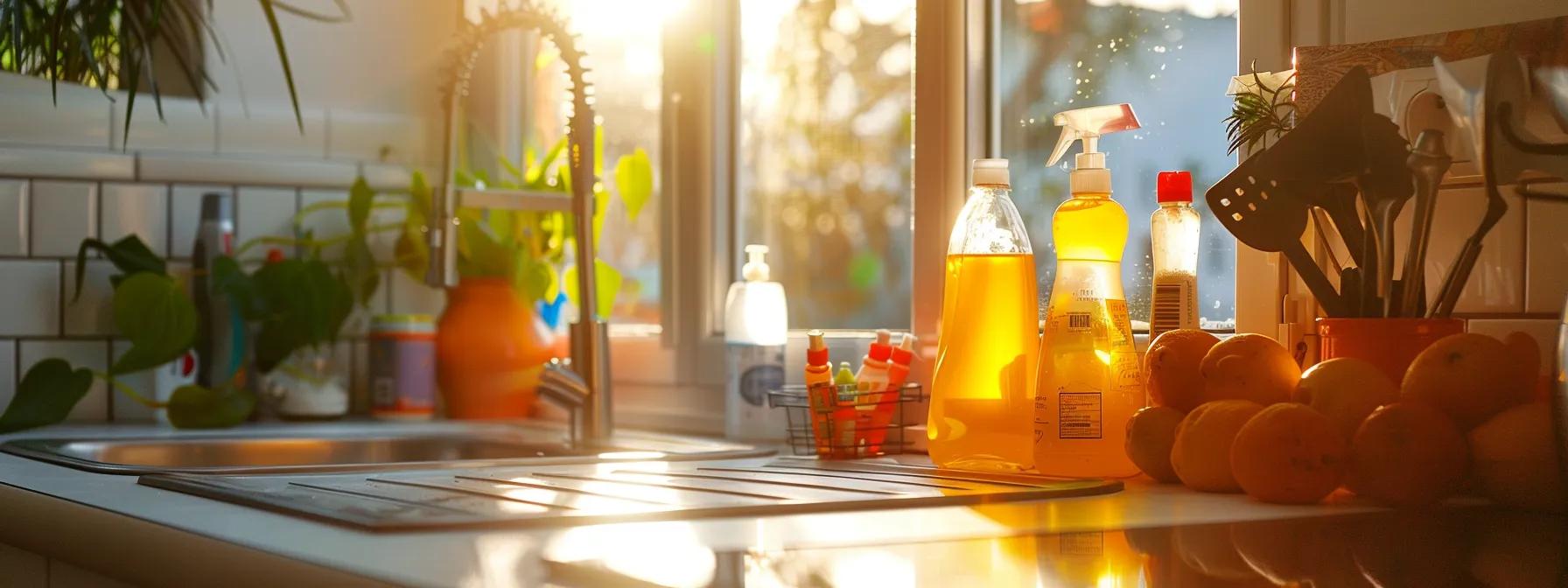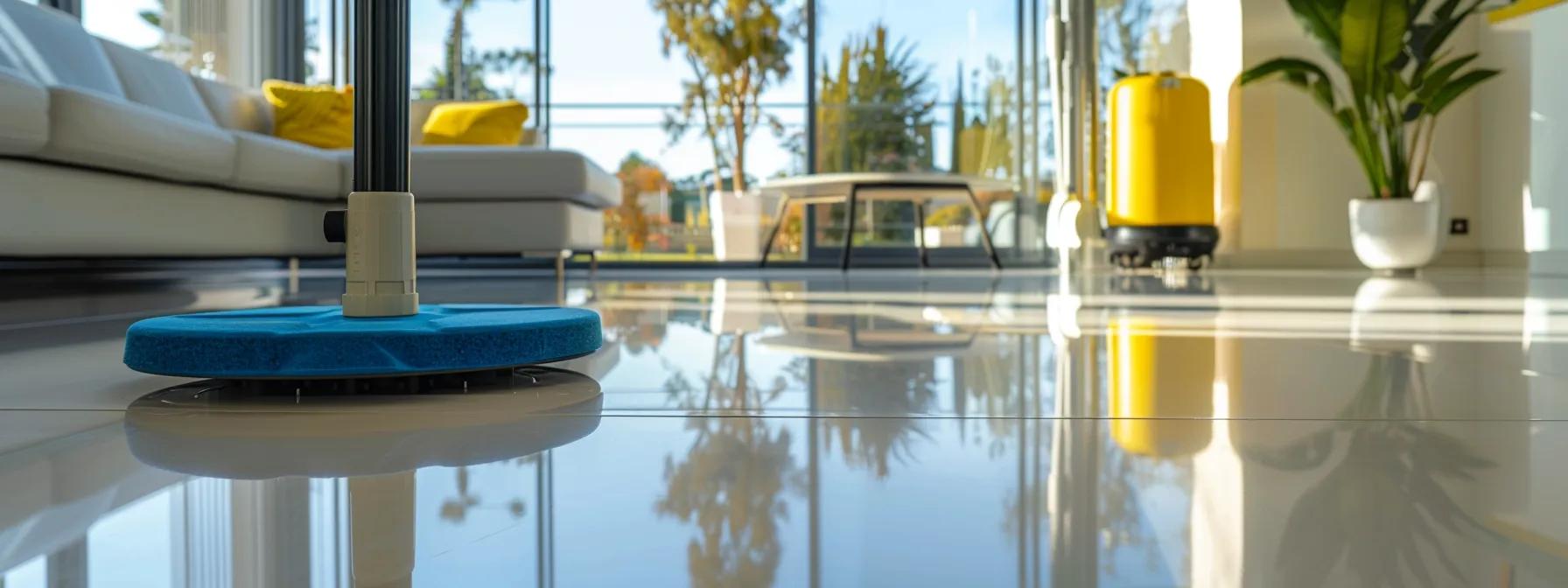What Is the Most Efficient Method for Cleaning an Oven?
- Baking Soda and Water Paste: Apply the paste within the oven and let it sit for a few hours or overnight. Once you return, wipe it off with a damp cloth or paper towel. This is a natural way to clean your oven without using harsh chemicals, reducing toxicity and avoiding corrosion on surfaces like stainless steel and vitreous enamel.
- Commercial Oven Cleaners: If your oven has very stubborn stains or baked-on food, a commercial oven cleaner is the way to go. Many prefer using sodium hydroxide or potassium hydroxide based cleaners because they break down tough messes quickly. Always follow the instructions on the bottle to use them safely. Ensure your kitchen is well-ventilated by opening windows and doors to disperse strong odors. Wear personal protective equipment like gloves and a mask to protect your skin and eyes from harmful chemicals.
- Self-Cleaning Ovens: Some ovens come with a built-in self-cleaning feature. This process uses high temperature to turn leftover food into ash, which can be easily wiped away. It’s convenient but consumes a fair amount of time and requires the oven to cool down before opening. Always refer to your oven’s manual for the duration of the cleaning cycle and necessary safety procedures.
The best way to clean your oven is to develop a method that is both effective and easy for you. Whether you choose natural cleaners like vinegar and lemon juice, store-bought cleaners, or the self-cleaning feature, regular cleaning will make the job easier and keep your kitchen organized.
Chemco Non-caustic Oven Cleaner
Best non-toxic oven cleaner
Chemco Dirt Buster III Non-caustic Oven Cleaner (Case of 6-1 Liter Bottles)

- NSF Category A1 certified
- Safe for commercial and household use
- Non-caustic formulation
- Works over a period
- All-Purpose: Yes
- Form: Spray
- Size: 1 Liter
- Made In: USA
- Safe for Aluminum: Yes
Dental Creations Metal Ion Remover

- No need for expensive carbon products
- No vacuum needed
- Effective at cleaning
- Can be difficult to locate
- Extra formulas are a separate purchase
- Weight: Various Sizes of Laboratories
- Use: Removes ion contaminants
- Contents: Formula 1, Formula 2 & Crucible
- Brand: Dental Creations
- Recommended Use: Every two months
Nu-Foam Heavy Duty Oven Cleaner

Best multipurpose oven cleaner
- Non-toxic and biodegradable
- Safe for non-food surfaces
- Can be sprayed or brushed on
- Can hurt your skin
- Needs about 30 minutes to work
- Form: Liquid
- Brand: Nu-Foam
- Scent: Unscented
- Size: 1-Gallon (2 bottles)
- Features: Heavy Duty Oven Cleaner
Diversey CB991206 Break-Up Professional Oven & Grill Cleaner
Best heavy-duty oven cleaner
- NSF-certified for use in food service areas
- Safe for commercial kitchens
- Works well on tough grease
- Strong fumes
- Unpleasant odor
- Weight: 19-Ounce
- Style: Aerosol
- Recommended Surface: Commercial ovens and grills
- Scrubbing: Minimal needed
- Hazardous: No
- Scent: Citrus
Are There Any Potential Hazards?
Using oven cleaners can be really helpful, but it’s important to be careful. Many oven cleaning chemicals have strong substances like sodium hydroxide or potassium hydroxide, which can be harmful if you breathe them in or get them on your skin. Always wear gloves and maybe a mask, and make sure your kitchen is well-ventilated by opening windows and doors when you clean. This helps keep you safe from the strong smells and chemicals.
Don’t mix different cleaning products, especially ones with acids, because this can create toxic fumes. Always read the instructions on the bottle and never use more than what’s recommended. Keep these cleaners out of reach of kids and pets to prevent accidents. Even small amounts can be dangerous if swallowed.
Also, think about the environment. Some oven cleaners can harm water and plants if they get into the environment. If you care about being eco-friendly, look for cleaners that are safe for the environment or use natural solutions like baking soda and vinegar. These are safer for both your home and the planet.
Is It Safe to Use Oven Cleaner on a Self-Cleaning Oven?
Self-cleaning ovens are designed to clean themselves by heating up and turning food spills into ash. But you might wonder if it’s okay to use oven cleaners on them too. It’s best to be careful because using regular oven cleaners with a self-cleaning oven can sometimes damage it.
Manufacturers usually advise against using harsh chemicals in self-cleaning ovens. The high heat from the self-cleaning cycle can make the chemicals release bad fumes. Additionally, some cleaners can wear down the inside parts of the oven, especially if they’re not made for self-cleaning models. Always check your oven’s manual before using any cleaner to make sure you don’t mess it up or void the warranty.
If your self-cleaning oven still has some tough spots after a cycle, try natural cleaners like a baking soda and water paste. These are gentle and won’t harm your oven. You can also wipe the oven with a damp cloth or microfiber towel regularly to keep it clean without needing strong cleaners. Taking good care of your self-cleaning oven will help it last longer and work better.
How Frequently Should I Clean My Oven?
Keeping your oven clean is important for it to work well and to make sure your food tastes great. You should clean your oven every three to six months, depending on how much you cook and what you cook. If you often roast, bake, or cook messy foods like pizza, you might want to clean it every month to keep the grease and fat from building up.
If you see any food spills or residues after cooking, clean them right away. This makes the cleaning job easier later on. Also, if your oven starts to smell bad while you’re cooking, it’s time for a thorough cleaning. Using the best oven cleaning chemicals can help break down the grime quickly and make cleaning faster. Choose eco-friendly cleaners if you want something that’s better for the environment and safer for your kitchen.
Besides deep cleaning, doing small clean-ups regularly can help your oven last longer. Wipe down the outside and the door with a sponge or paper towel after each use to prevent grease from building up. If your oven has removable parts like racks or bakeware, soak them in warm soapy water or dishwashing liquid after cooking. This keeps everything clean and your oven working well.
How often you clean your oven depends on how you cook and what you cook. By keeping up with regular cleaning and using good oven cleaners, your oven will stay in great shape and make your cooking easier and more enjoyable.
Do I Need to Ventilate My Home While Cleaning My Oven?
Yes, it’s very important to ventilate your home when you’re cleaning your oven, especially if you’re using strong oven cleaners. Many commercial oven cleaners have strong chemicals that can produce harmful fumes. To stay safe, always open windows and doors to let fresh air in. This helps to reduce the concentration of the fumes in the air, making it safer to breathe.
If you live in a place with high pollution or allergies, you might want to use an air purifier to keep the air clean while you clean your oven. Proper ventilation not only keeps you safe but also makes the cleaning process more pleasant by getting rid of strong smells faster. So, before you start cleaning, make sure your kitchen is well-ventilated by letting fresh air flow through.
Will a Clean Oven Make My Food Taste Better?
Yes, a clean oven can make your food taste better! When your oven is dirty, leftover grease and food particles can create bad smells and even smoke, which can make your food taste weird. Cleaning your oven removes these unwanted smells and keeps your cooking area fresh. Plus, a clean oven helps cook your food evenly, so your dishes come out just right every time.
Using natural oven cleaners like baking soda, vinegar, and lemon juice can also be a great way to keep your oven clean without using harsh chemicals. These natural solutions are safe and effective, leaving your oven spotless and your kitchen smelling fresh. When your oven is clean, your meals will taste better, and cooking will be more enjoyable.
Are There Any Eco-Friendly Oven Cleaners?
Yes, there are eco-friendly oven cleaners that are good for both your oven and the environment. These cleaners use natural ingredients like baking soda (sodium bicarbonate), vinegar (citric acid), and lemon juice instead of harsh chemicals like sodium hydroxide. They work just as well to remove grease and grime without harming the planet.
Eco-friendly oven cleaners are better for your health too because they don’t release strong fumes. They help keep your kitchen safe and clean while being kind to nature. By choosing these green cleaning products, you can keep your oven sparkling without worrying about harmful chemicals.
What Are Some Natural Alternatives to Chemical Oven Cleaners?
If you want to avoid using strong chemicals, there are several natural ways to clean your oven. Here are some easy and effective methods:
Baking Soda and Water (Sodium Bicarbonate): Mix baking soda with water to make a paste. Spread it inside your oven and let it sit for a few hours or overnight. Then, wipe it off with a damp cloth or sponge. This helps remove grease and stains naturally.
Vinegar and Baking Soda: After applying the baking soda paste, spray vinegar (citric acid) over it. The mixture will fizz and help lift off the grime. Wipe everything clean with a damp cloth or paper towel for a fresh-smelling oven.
Lemon Juice: Mix lemon juice with water and spray it on the dirty areas of your oven. Let it sit for a while, then wipe it off with a sponge or microfiber towel. Lemon juice not only cleans but also leaves a nice scent.
These natural cleaners are safe, effective, and better for the environment. They help keep your oven clean without using harmful chemicals, making your kitchen a healthier place for you and your family.
Conclusion
Cleaning your oven doesn’t have to be scary or hard. With the right oven cleaners and methods, you can keep your oven sparkling clean easily. Whether you choose a powerful commercial cleaner, a safe non-toxic option, or a natural homemade solution, regular cleaning will make your oven last longer and cook your food better. Remember to always stay safe by ventilating your kitchen and wearing gloves when using strong cleaners. With these tips and the best oven cleaners of 2025, your oven will stay clean and ready for your next delicious meal!
Additional Tips and Hacks:
- Use a scrub daddy or scouring pad for tough spots.
- Keep a plastic bag handy to dispose of used cleaning agents safely.
- Store your oven cleaners in a bottle with a secure lid to prevent spills.
- Regularly check for rust or corrosion on oven parts and clean them promptly.
- Use essential oils like lemon or eucalyptus in your cleaning mixture for a pleasant scent.
- Always wear personal protective equipment like gloves and masks to reduce toxicity exposure.
- For stainless steel surfaces, use a soft microfiber towel to avoid scratches.
- Avoid using pressure washing or steam cleaning directly on your oven to prevent damage.
- Keep your cookware and bakeware clean to reduce the amount of grease and fat that builds up in your oven.
- Use a scraper to gently remove stubborn debris without scratching.
- Place a bowl of salt or vinegar in the oven overnight to help absorb odors.
- Use pumice stones carefully on tough stains for extra cleaning power.
- Regularly clean your cooktop and stove to prevent grease buildup that can transfer to the oven.
Safety Reminders:
- Always read the safety data sheet for any cleaning product you use.
- Keep all cleaners out of reach of children and pets.
- Never mix different cleaning chemicals, especially those containing acid and alkali, to avoid dangerous reactions.
- Ensure proper ventilation to prevent inhaling harmful fumes.
- Use the right cleaning solution for different oven surfaces to prevent corrosion and damage.
By following these guidelines and using the best oven cleaners, you can maintain a clean, safe, and efficient kitchen environment.





